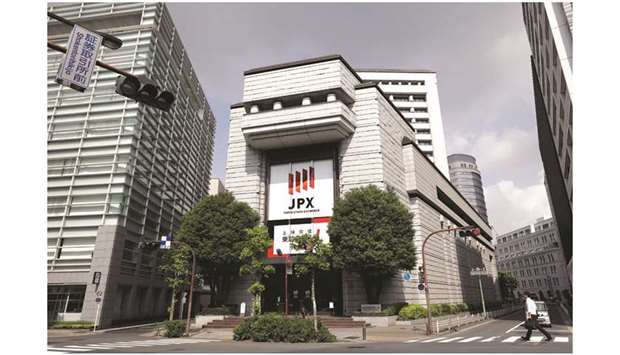Asian markets rose yesterday as investors cheered data showing a surprise jump in Chinese factory activity, while oil prices bounced from last week’s sharp losses after Iraq said top producers could announce a cut in output this week.
But while the week started on a positive note, worries about trade were revived by China’s Global Times newspaper saying Beijing wanted all US tariffs rolled back as part of a mini deal, a move observers said Washington is unlikely to agree to.
China said on Saturday that its manufacturing sector expanded in November for the first time in seven months, providing a much-needed boost to investors looking for signs of optimism in the world’s number-two economy.
Another survey yesterday of smaller firms also showed a better-than-expected pick-up in factory activity.
The news comes as Beijing and Washington put the final touches to a partial trade deal, the expected passage of which has helped global markets rally for weeks.
“This improvement in the manufacturing (purchasing managers index) is important because we can say with more certainty than at the beginning of the year that China’s macro outlook is indeed stabilising,” Aninda Mitra, senior sovereign analyst at BNY Mellon Investment Management, told Bloomberg News.
“A phase one-related pause, which seems to be around the corner, could herald the end of further, scheduled tariff hikes and the rollback of those imposed in September.”
Hong Kong rose 0.4% and Shanghai edged up 0.1%, while Sydney and Seoul each finished 0.2% stronger.
Tokyo ended up 1% at a 14-month high, Taipei and Mumbai added 0.1% and Manila rallied more than 1% with Jakarta also rising.
But Singapore, Wellington and Bangkok fell.
“Recent manufacturing PMI data does appear to be showing signs of an improvement, not only in the US, but across the rest of the world,” said Michael Hewson at CMC Markets UK.
“This would appear to be a welcome respite to what has been an awful year for the manufacturing sector, which has to all intents and purposes been in recession for most, if not all, of this year.”
However, analysts raised concerns about an article in the Communist Party-linked Global Times, which tweeted that the government wants levies imposed on China to be removed as the US talks continue.
It also said leaders wanted tariffs lined up for December 15 to be taken off the table.
But OANDA senior market analyst Jeffrey Halley said: “It is hard to see the US swallowing a very bitter trade pill like that; it would, in effect, remove all of the US’s leverage in the far more difficult comprehensive trade negotiations to come.” “It is now becoming more apparent why the talks have dragged on so long.”
There was little immediate reaction on markets to news that China had slapped punitive measures on the US in retaliation for its backing of a pro-democracy movement in Hong Kong, announcing sanctions on NGOs and suspending visits by US warships and aircraft.
On oil markets, both main contracts rallied after Iraq said on Sunday that Opec and other major producers would consider slashing output by 400,000 barrels a day to support prices when they meet in Vienna this week.
The gains chipped away at some of the huge losses suffered Friday after reports said Russia was looking to delay any further output reductions until April’s gathering.
But AxiTrader’s Stephen Innes said that while the headline figure “might provide some initial price support, it might not be a huge swing factor since Russia at this time seems set against (a cut) in favour of stricter compliance”.
In early trade London and Frankfurt each rose 0.2%, while Paris gained 0.3%.
In Tokyo, the Nikkei 225 closed up 1.0% to 23,529.50 points; Hong Kong — Hang Seng ended up 0.4% to 26,444.72 points and Shanghai — Composite closed up 0.1% to 2,875.81 points yesterday.

An external view of the Tokyo Stock Exchange. The Nikkei 225 closed up 1.0% to 23,529.50 points yesterday.
